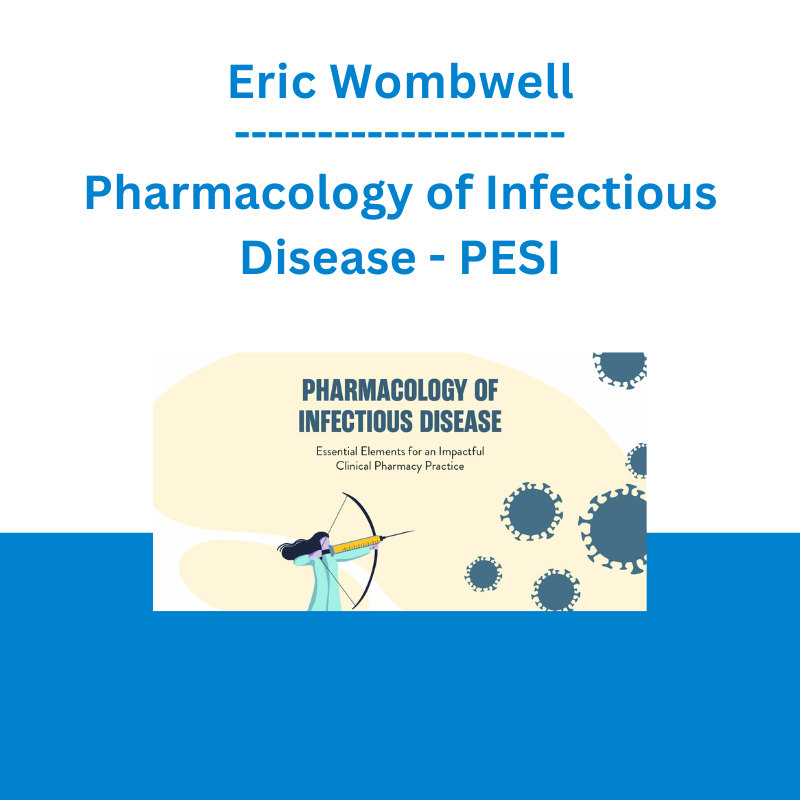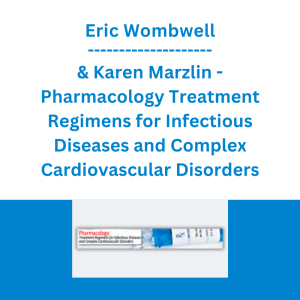*** Proof of Product ***
Exploring the Essential Features of “Eric Wombwell – Pharmacology of Infectious Disease: Essential Elements for an Impactful Clinical Pharmacy Practice – PESI”
Speaker: Eric Wombwell, PharmD, BCIDP
Duration: 6 Hours 28 Minutes
Format: Audio and Video
Copyright: Feb 15, 2021
Media Type: Digital Seminar
Description
Dr. Eric Wombwell, PharmD, and Board Certified Infectious Disease Pharmacist will be your guide in this seminar, as you learn the latest evidence in the pharmacology of infectious diseases and application of this evidence to enhance your clinical pharmacy practice.
With new antibiotics, vaccines, treatment guidelines, and evidence-based research continuously becoming available, the need to stay up-to-date is an imperative for pharmacists. The CDC recommends that pharmacists receive ongoing education about a variety of areas, including adverse reactions to antibiotics, antibiotic resistance and optimal prescribing.
Dr. Wombwell will draw attention to clinical situations where antibiotics are overprescribed, unnecessarily used, and underutilized in the treatment of infections. He will provide approaches to improve antibiotic use in these situations—resulting in reduced antibiotic cost, resistance, and collateral damage, improving patient outcomes in both outpatient and inpatient environments.
You’ll leave with the knowledge and strategies to:
- Integrate current, best-practice treatment guidelines
- Limit adverse reactions from antibiotics
- Implement antimicrobial de-escalation strategies
- And more!
The need for robust antibiotic stewardship has never been more pressing.
Speaker
Eric Wombwell, PharmD, BCIDP
Dr. Eric Wombwell is a board-certified infectious diseases pharmacist and clinical associate professor for the Department of Pharmacy Practice and Administration at the University of Missouri – Kansas City, School of Pharmacy. Eric completed his PharmD degree at the University of Missouri Kansas City, followed by an ASHP accredited pharmacy practice residency at the Kansas City VA Medical Center. Following residency, he accepted a full-time non-tenured clinical faculty position at the University of Missouri – Kansas City, School of Pharmacy. His teaching responsibilities include infectious diseases topics throughout the curriculum. Eric also has a clinical appointment at Centerpoint Medical Center rounding with the infectious diseases consult team and supporting antimicrobial stewardship efforts at the facility.
Eric is regularly published in pharmacy and infectious diseases research and is frequently invited to deliver continuing education presentations locally and nationally to various health-professional audiences. He is recognized for excellence in teaching through various awards, including the “Missouri Pharmacist Association – UMKC Faculty Member of the Year”, and the “University of Missouri – Kansas City Provost’s Award for Excellence in Teaching”.
Speaker Disclosures:
Financial: Eric Wombwell has an employment relationship with the University of Missouri. He receives a speaking honorarium, recording royalties, and a consulting fee from PESI, Inc. He has no relevant financial relationships with ineligible organizations.
Non-financial: Eric Wombwell is a member of the Society of Infectious Diseases Pharmacists, the Missouri Pharmacists Association, American Association of Colleges of Pharmacy, Infectious Diseases Society of America, and Centerpoint Medical Center.
Objectives
- Develop antibiotic recommendations in response to microbiologic testing results.
- Describe clinical scenarios compelling for empiric coverage of resistant bacteria.
- Discriminate clinical scenarios requiring initiation of antibiotics.
- Choose appropriate risk factor–based empiric antibiotic regimens for acute infections.
- Recognize clinical scenarios necessitating avoidance of specific antibiotics based on side effect profiles.
- Identify clinical situations appropriate for newly approved antimicrobials.
Outline
Considerations for Successful Empiric Therapy
- Spectrum of activity for commonly used antibiotics
- Normal flora for infectious sites
- Resistance associated with common bacteria
- Pharmacodynamic influences on antibiotic dosing
Interpretation of Microbiologic Test Results
- Gram stain results
- Culture and sensitivity results
- Minimum inhibitory concentration (MIC) evaluation
- PCR results
Antibacterial Resistance
- Trends
- Mechanisms of resistance
- Contributing factors
- Antibiotic stewardship concepts
Antibiotic Related Allergies– Penicillin and ‘Sulfa’
- Define true allergy versus side effect
- Penicillin allergy and cephalosporin cross sensitivity
- ‘Sulfa’ allergy
SARS-CoV-2
- Clinical trial data for therapeutics
- Clinical trial data for vaccines
Skin and Soft Tissue Infections
- Streptococcus pyogenes vs. MRSA
- Evidence for antibiotic management
- IDSA treatment guidelines
- Vancomycin AUC/MIC monitoring
Pneumonia
- Evidence for pathogen etiology
- Evidence for antibiotic management
- IDSA/ATS community-acquired pneumonia treatment guidelines
- Resistance risk factors and management
- IDSA/ATS hospital- and ventilator-acquired pneumonia treatment guidelines
- New antibiotics for MDR infections
Influenza
- Evidence on vaccine timing and use in older adults
- Clinical trial data for therapeutics
- IDSA/CDC treatment guidelines
Urinary Tract Infections
- Resistance trends
- Clinical trial data for therapeutics
- Antibiotics for MDR infections
Clostridium Difficile Infection
- Risk factor literature review
- Compare antibiotic risk levels
- IDSA treatment guidelines
- Clinical trial data for therapeutics
- Probiotics prophylaxis evidence review
Target Audience
Inpatient and outpatient pharmacists engaged in review of antimicrobial prescription orders. In particular, those pharmacists interested in obtaining further antimicrobial expertise to aid in the care of patients with infectious diseases through optimal antimicrobial drug choice, route, dose, and duration of use.
Please see the full list of alternative group-buy courses available here: https://lunacourse.com/shop/










 Eric Wombwell & Karen Marzlin - Pharmacology Treatment Regimens for Infectious Diseases and Complex Cardiovascular Disorders
Eric Wombwell & Karen Marzlin - Pharmacology Treatment Regimens for Infectious Diseases and Complex Cardiovascular Disorders